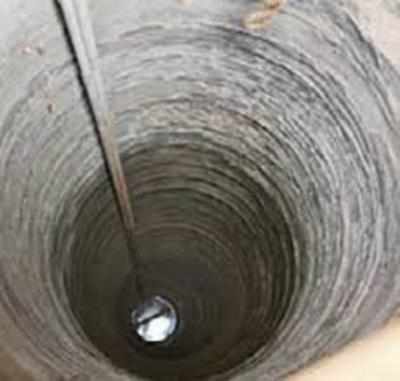- News
- Exploitation of groundwater in India for meeting short-term demand can hamper long-term goals, expert says
This story is from February 28, 2018
Exploitation of groundwater in India for meeting short-term demand can hamper long-term goals, expert says
Rapid industrialisation during the last few centuries have increased greenhouse gas emissions, leading to global warming.

CHENNAI: Rapid industrialisation during the last few centuries have increased greenhouse gas emissions, leading to global warming. Added to this, there are other climate-related issues due to urbanisation and pollution. While high economic growth rates in China and India have increased the prevalence of chronic obstructive pulmonary diseases, simultaneous increases in population levels and life expectancy raise the long-term demand for land, water, energy and food.It is therefore important to analyse the inter-relationships between climate variables and agricultural outputs in countries like India that have achieved rapid economic growth, says Alok Bhargava, a senior Indian-American econometrician.
“Steady exploitation of groundwater in north Indian states for meeting short-term demand can hamper long-term goals such as providing sanitation for the population,” he said while talking on “climate variability, rice production and groundwater depletion in India” at MS Swaminathan Research Foundation here recently.
Bhargava’s paper, published in the Environmental Research Letters 2018, a quarterly, peer-reviewed, scientific journal covering research in all aspects of environmental science, modelled the proximate determinants of rice outputs and groundwater depths in 27 Indian states during 1980–2010. It has presented comprehensive analyses of the proximate determinants of rice outputs and groundwater depths at the state level in India.
“The main findings from models for rice outputs were that temperatures and rainfall levels were significant predictors, and the relationships were quadratic with respect to rainfall. Moreover, nonlinearities with respect to population changes indicated greater rice production with population increases,” he said.
Bhargava said 77% increase in population in India during 1980–2010 significantly affected rice outputs and groundwater depths at the state level. While it has been suggested that the 'demographic dividend' from having a young labour force support older age groups may be helpful for economic development, it is important to consider the broader consequences of population growth in countries with high population densities.
“Owing to poor access to healthcare and family planning services especially in rural areas of developing countries, many children are regarded by their mothers as either being born earlier than expected or were simply 'unwanted',” he said. For example, approximately a third of the children born in Bihar, Madhya Pradesh, Rajasthan and Uttar Pradesh were regarded as 'unwanted', according to him.
“In the absence of access to high quality healthcare and family planning services, it is difficult for poor rural households to achieve their 'desired' family size and educate the children. Rapid population growth creates simultaneous pressures on food production systems and the environment. While there is a need for replenishing groundwater via better technologies, healthcare and family planning services should be integral components of long-term policies for mitigating the effects of climate variables,” he said.
“Steady exploitation of groundwater in north Indian states for meeting short-term demand can hamper long-term goals such as providing sanitation for the population,” he said while talking on “climate variability, rice production and groundwater depletion in India” at MS Swaminathan Research Foundation here recently.
Bhargava’s paper, published in the Environmental Research Letters 2018, a quarterly, peer-reviewed, scientific journal covering research in all aspects of environmental science, modelled the proximate determinants of rice outputs and groundwater depths in 27 Indian states during 1980–2010. It has presented comprehensive analyses of the proximate determinants of rice outputs and groundwater depths at the state level in India.
“The main findings from models for rice outputs were that temperatures and rainfall levels were significant predictors, and the relationships were quadratic with respect to rainfall. Moreover, nonlinearities with respect to population changes indicated greater rice production with population increases,” he said.
However, he said the groundwater depths were positively associated with temperatures and negatively with rainfall levels and there were nonlinear effects of population changes. “The dynamic models for in situ groundwater depths in 11, 795 wells in mainly unconfined aquifers, accounting for latitudes, longitudes and altitudes, showed steady depletion. Overall, the results indicated that population pressures on food production and environment need to be tackled via long-term healthcare, agricultural, and groundwater recharge policies in India,” said Bhargava, who is a professor at the University of Maryland.
Bhargava said 77% increase in population in India during 1980–2010 significantly affected rice outputs and groundwater depths at the state level. While it has been suggested that the 'demographic dividend' from having a young labour force support older age groups may be helpful for economic development, it is important to consider the broader consequences of population growth in countries with high population densities.
“Owing to poor access to healthcare and family planning services especially in rural areas of developing countries, many children are regarded by their mothers as either being born earlier than expected or were simply 'unwanted',” he said. For example, approximately a third of the children born in Bihar, Madhya Pradesh, Rajasthan and Uttar Pradesh were regarded as 'unwanted', according to him.
“In the absence of access to high quality healthcare and family planning services, it is difficult for poor rural households to achieve their 'desired' family size and educate the children. Rapid population growth creates simultaneous pressures on food production systems and the environment. While there is a need for replenishing groundwater via better technologies, healthcare and family planning services should be integral components of long-term policies for mitigating the effects of climate variables,” he said.
End of Article
FOLLOW US ON SOCIAL MEDIA
